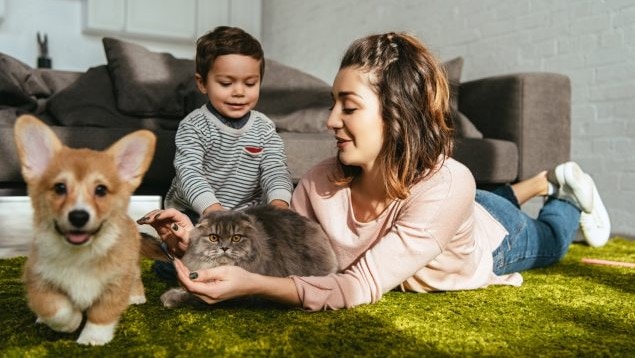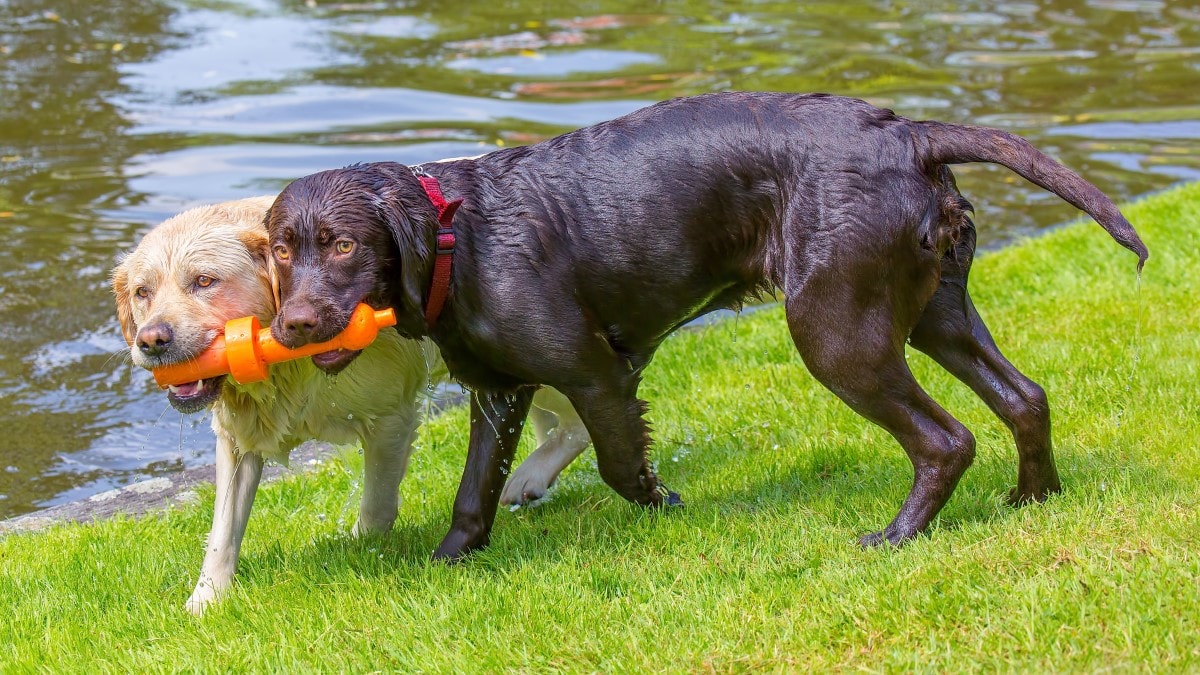Key points
- Although animals can spread Giardia to people, you are unlikely to get a Giardia infection from dogs or cats.
- If your pet has diarrhea that is not going away, contact a veterinarian.
- To prevent Giardia from spreading to other pets, take precautions like keeping sick pets away from bodies of water and cleaning their items.

Overview
Animal poop can contain Giardia germs that may make people or other animals sick. This can happen even when an animal looks healthy. Some animals—such as birds or chinchillas—are more likely to spread Giardia to people.
Signs and symptoms
Signs and symptoms of Giardia infection in both people and pets can include:
- Diarrhea
- Gas
- Stomach pain
- Nausea
- Vomiting
It is possible for people or pets to be infected and have no signs or symptoms of illness.
Risk factors
Young animals, like puppies and kittens, are more likely to get sick than adult animals.
How it spreads
Anything that touches poop from people or animals infected with Giardia can be contaminated with Giardia germs. People and animals get infected when they swallow Giardia germs.
How dogs and cats get Giardia
Your dog or cat might get infected by:
- Swallowing even small amounts of contaminated poop from another dog or cat
- Rolling or playing in contaminated soil
- Licking their body after it touches a contaminated surface, like a dirty litter box or dog crate
- Drinking from a contaminated creek, pond, or other water source
Getting Giardia from pets
You are unlikely to get a Giardia infection from dogs or cats. The type of Giardia that makes people sick is usually not the same type that makes dogs and cats sick.
If you have other kinds of pets, ask your veterinarian if your pets are likely to spread Giardia to you. Some types of Giardia can spread between people and animals like chinchillas, beavers, birds, opossums, and monkeys.
Giardia survives outside
Giardia can survive for several months in cold water or soil. Giardia survives much longer in moist, cool environments than in dry, warm environments that have direct sunlight.

Prevention
Preventing spread from pets to people
You are unlikely to get a Giardia infection from your dog or cat. These steps can reduce your risk even further:
- Wear gloves when gardening to avoid touching poop or soil containing Giardia.
- Clean and disinfect regularly, especially pet items like toys, crates, and bowls.
- Wash your hands after touching pets or their poop, food, or supplies.
Preventing re-infection and spread to other pets
Take the following steps to help prevent your pet from getting sick from Giardia again or spreading it to other animals.
If your dog or cat is being treated for Giardia, tell your veterinarian if you have other dogs or cats. Let them know even if your other pets do not have diarrhea. Sometimes animals that do not seem sick are infected and spreading Giardia germs. Your veterinarian may start your other pets on medication.
Bathe your dog or cat to remove any poop from their fur.
Change cat litter boxes every day.
Limit your dog's access to creeks, ponds, lakes, and other bodies of water. This helps prevent your dog from getting sick again by drinking contaminated water. It also helps prevent your dog from contaminating the water with their poop, which could make other animals sick.
Cleaning and disinfecting
While your pet is sick, regularly clean and disinfect pet items and areas where your pet spends time, such as:
- Toys
- Water and food bowls
- Bedding
- Crates
- Litter boxes
- Floors
If your pet is taking medication for a Giardia infection, clean and disinfect their items daily if possible. Do this until a few days after their last dose of medication.
Clean pet items outside to avoid getting Giardia germs on surfaces in your home. If cleaning outside is not possible, clean items in a laundry sink or bathtub. Then, disinfect that area immediately after.
Reducing Giardia outside
Completely removing Giardia from your yard or outdoor space is difficult. However, taking the following steps can reduce the number of Giardia germs, lowering the risk of pets or people getting sick.
Always remove poop from your yard or outdoor area by putting it in a bag and throwing it away.
If your pet has diarrhea or is taking medication for a Giardia infection, limit their access to common outdoor spaces as much as possible. This includes dog parks and public trails. Also do not let new animals, especially young puppies or kittens, into your yard or outdoor space. Ask your veterinarian when you can allow new animals in your yard again.
Remove standing water outside. For example, empty any containers of water and remove water from fountains you are not using.
Do not use bleach or quaternary ammonium compounds on your soil or grass. Disinfection products will not kill Giardia in soil or grass.
Testing and diagnosis
If your pet has diarrhea that is not going away, contact a veterinarian. Many kinds of germs can cause diarrhea. Knowing which germ is making your pet sick helps your veterinarian decide what treatment to give them.
A veterinarian may take stool (poop) samples from your pet to check for Giardia germs in their poop. Your pet may not pass Giardia every time they poop, so the veterinarian may need to test multiple poop samples. Additionally, your pet may stop having diarrhea and seem healthy before they stop passing Giardia in their poop.
